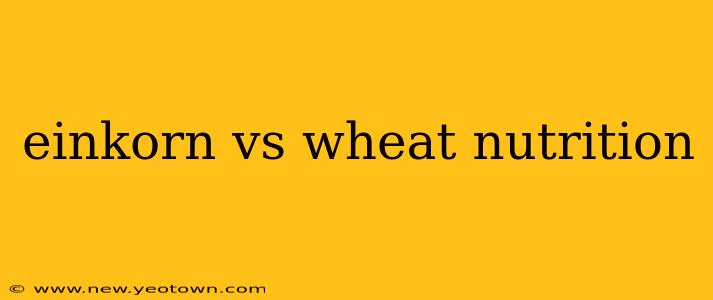The ancient grains aisle can feel like a battlefield of nutritional claims. Today, we're diving deep into a head-to-head comparison of two grains often found side-by-side: einkorn and wheat. This isn't just about calories; we'll explore the nuances of their nutritional profiles, uncovering why one might be a better choice for your specific needs. Our journey begins with a story…
Imagine a time long before modern agriculture, when grains were simpler, closer to their wild ancestors. That's the world of einkorn wheat, a single-kernel grain that's been cultivated for millennia. It represents a kind of nutritional purity, untouched by the intensive breeding that has shaped modern wheat. Now, picture the bustling fields of today, filled with high-yielding varieties of wheat, bred for productivity and disease resistance. This modern wheat, while offering its own advantages, also presents a contrasting nutritional landscape.
What is Einkorn Wheat?
Einkorn, often touted as the "original wheat," is a diploid grain, meaning it has only two sets of chromosomes, unlike its polyploid counterparts like modern wheat (which has six). This simpler genetic makeup contributes to its unique nutritional profile. Think of it as the "granddaddy" of wheat, a more primitive but potentially more potent version.
What are the Nutritional Differences Between Einkorn and Wheat?
Let's cut to the chase: the nutritional differences between einkorn and wheat are significant, though not always easily summarized. While both are sources of carbohydrates, fiber, and protein, their compositions vary noticeably.
Einkorn's Nutritional Strengths:
- Higher Protein: Generally, einkorn boasts a higher protein content compared to modern wheat varieties. This protein often includes a better balance of amino acids.
- More Fiber: Einkorn frequently outperforms modern wheat in fiber content, contributing to improved digestion and gut health. This is particularly important for those battling issues like constipation or blood sugar regulation.
- Mineral Rich: Einkorn often contains higher levels of certain minerals, such as magnesium, zinc and iron.
- Lower Glycemic Index: Einkorn tends to have a lower glycemic index (GI) than modern wheat, meaning it causes a slower rise in blood sugar after consumption. This is beneficial for individuals managing diabetes or those focused on blood sugar control.
- Easier Digestion: Its simpler genetic structure can be easier to digest for some individuals who experience sensitivities to modern wheat.
Modern Wheat's Nutritional Aspects:
- Higher Yield: Modern wheat is engineered for high yields, making it a cost-effective staple.
- Gluten Content: Both einkorn and modern wheat contain gluten, but the protein structure of einkorn's gluten is often described as being less allergenic for some (though this is not a guarantee for those with celiac disease or severe gluten sensitivity).
- Adaptability: Modern wheat varieties are bred for various climates and conditions, allowing cultivation across different regions.
Does Einkorn Have Less Gluten Than Wheat?
Does einkorn have less gluten than wheat?
While einkorn does contain gluten, its gluten structure differs from modern wheat's, resulting in potential digestive advantages for some individuals. The amount of gluten present isn't necessarily lower, but its different composition might lead to less pronounced reactions. It's crucial to remember that those with celiac disease or severe gluten sensitivities must still avoid einkorn.
Is Einkorn Healthier Than Wheat?
Is einkorn healthier than wheat?
There's no single "healthier" grain. Einkorn's nutritional profile often presents benefits in terms of protein, fiber, and mineral content, along with a lower glycemic index, making it a potentially advantageous option for certain individuals. However, modern wheat's higher yield and adaptability have made it a significant global food source. The "healthiest" choice depends entirely on individual needs, dietary restrictions, and preferences.
Einkorn vs Wheat: Which is Better for Baking?
How does einkorn compare to wheat for baking?
Einkorn's slightly lower gluten content and different protein structure require some adjustments in baking techniques compared to modern wheat. While it can produce delicious results, you might need to experiment with hydration levels and rising times to achieve the desired texture. Some bakers find it lends itself well to rustic breads and pastries, offering a unique nutty flavor.
Conclusion: Making Informed Choices
The einkorn vs. wheat debate isn't a simple "winner takes all" scenario. Both grains offer distinct nutritional profiles and suitability for different needs. Understanding these differences empowers you to make informed choices based on your own health goals and preferences. If you're considering incorporating einkorn into your diet, consult with a healthcare professional or registered dietitian to ensure it aligns with your individual dietary requirements.

